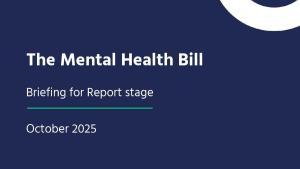The Terminally Ill Adults (End of Life) Bill has the potential to fundamentally alter our relationship to death, dying and medical care. It is perhaps the most consequential Bill this parliament will consider. I know that making sure it is as good a piece of legislation, with as robust safeguards, as possible weighs heavily on your mind, as it does on mine.
That is why I was so grateful to be invited by The Rt Hon the Lord Hope of Craighead KC to give evidence before the Lords Select Committee. It was an important acknowledgement that the Bill will affect children, even though as drafted only those over 18 with capacity will be able to choose to end their own lives. It will affect them because those they love will choose this, and they will need compassion and help to navigate the complexity of that grief. And it will affect them because it will shape the way they think about their own life, and their own death.
It is this latter group of children that I am particularly concerned about. Those children who are already living with life-limiting conditions, who are considering what their future might hold, and what a good death might look like. I and my team have visited children’s palliative care services in hospitals, hospices, and the community. And while I have met doctors and nurses who go to extraordinary lengths to give children the chance to live as full lives as possible, and to die with dignity where they or their family choose, this is not always possible.
Too often the lack of available hospices, the complexity of putting together community packages of care, or getting the basics of housing right means that children are dying in ways and places that were their family’s last choice. As one 15-year-old girl told me “The government gives no social care to people like me and then gives me an option to choose to die if I feel I can no longer live.”
This is particularly pertinent for 16-and-17-year-olds, who often fall through the gaps in palliative care. I am aware that some community palliative care services end at 16, but adult services won’t engage until 18.
This brings me to my concern about the line that has been drawn at 18 in this Bill. It is understandable of course. It is the age the UNCRC and the Children Act define a child. But young people up until the age of 25 also have hard-won rights, that acknowledge for those with additional vulnerabilities there should be no hard and fast cut off at 18. The Children Act 2004 instructs me as Children’s Commissioner to treat as a child anyone between 18 and 25 who has ever been in care. Children with Education, Health and Care plans are acknowledged by society to be more vulnerable, and so their rights to additional forms of support until they are 25 are enshrined in law. I strongly believe that every child who would come into the scope of the Bill as an adult, due to their illness, should automatically have such a plan. These young people with additional needs will have just transitioned to adult services, which is often a deeply destabilising and confusing time, where existing relationships are severed and children’s histories are missed. Every young person who would be in the scope of this Bill would by definition be vulnerable and should be entitled to those extra layers of safeguarding and consideration that we give to them in other areas.
Compelling arguments have also been made about the additional difficulties present in diagnosing young people in this age group, and predicting with certainty the chance of living for six months. I will not weigh in on the medical complexities but acknowledge that this is something children themselves worry about. One 16-year-old girl who had her own cancer diagnosis told me “This is a sensitive topic for me. Sometimes doctors can be wrong […] and if someone is told they have 6 months to live and they actually have a couple of years, I think they’re actually missing out, […] I think it can influence them.”
While this Bill is of course only for those who have capacity, and has additional requirements for advocacy for those with learning needs, the task of assessing capacity is going to be immensely challenging. Professionals will be operating in a different manner to under the Mental Capacity Act, where there is an assumption of capacity, and will have to be actively making an assessment about this immensely weighty decision. These challenges combined with the additional vulnerability and complex circumstances of a young person under the age of 25 make me deeply concerned about how those assessments will happen in practice.
For all these reasons I believe there is an urgent case to be made to extend the minimum age in the Bill to 25, and I therefore urge Peers to support Baroness Berger’s amendment to this effect.
I have seen other countries with a mature assisted dying framework in place move to consider whether mature minors, those that we might term ‘Gillick competent’, should be able to choose assisted dying. I hope that we can draw a line in the sand here and make clear that every child and young person should be supported to live – because at its root, as one girl of 15 told me, “This bill is not about how you die, it’s about how you live.”



